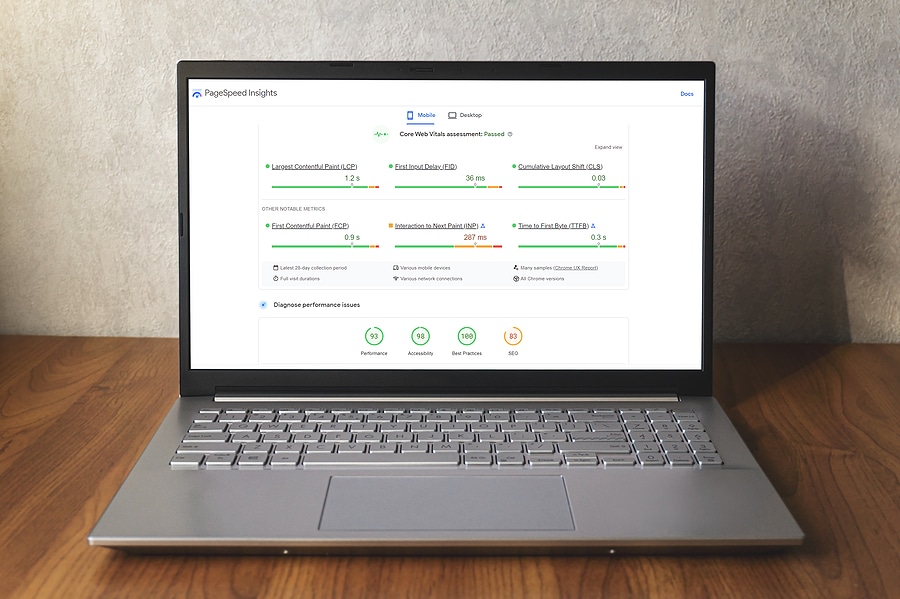
Is Your Digital Marketing Strategy Effective and Profitable?
By Jocelyn Van Saun
March 7, 2023
5 questions to ask your digital marketing provider
Are you frustrated with, or underwhelmed by, the effectiveness of your digital marketing strategy? Do you feel like no matter how hard your team works, it’s not resulting in enough leads and conversions?
If so, read on to discover five essential questions that you should ask your digital marketing provider in order to ensure that your strategy is serving its purpose and providing ROI.
1. Are you running multiple campaigns with blended costs?
It is important to work with your digital marketing provider to establish clear reporting and attribution mechanisms to ensure that you can accurately measure the impact of each campaign.
Running multiple campaigns and getting a blended lead cost from your provider can be problematic for several reasons:
- Inaccurate Attribution: Difficulty attributing leads to the right campaign can result in inaccurate reporting and undermine your determining which campaign is generating the best results to inform future marketing decisions.
- Varying Costs: Each campaign may have a different cost structure, targeting, and messaging. By blending the cost across all campaigns, you may be diluting the impact of more effective campaigns and over-investing in less effective ones.
- Difficulty in Optimization: Blending the cost of leads from multiple campaigns can also make it challenging to optimize campaigns effectively. Without a clear understanding of the costs associated with each campaign, you can’t make data-driven decisions about where to allocate budget and resources.
- Lack of Transparency: Blending costs can also mean a lack of transparency from your digital marketing provider by causing confusion over how much you are paying for each individual campaign. This will make it difficult to hold your provider accountable for their performance.
Overall, blending lead costs from multiple campaigns can interfere with accurately measuring the effectiveness of individual campaigns and making data-driven decisions about where to allocate budget and resources.
2. Are you utilizing a CRM to track lead sources and the revenue generated from each?
Tracking lead sources through a CRM (Customer Relationship Management) system and analyzing the revenue generated from those sources is crucial for any business to understand where traffic is coming from:
- Optimize Campaign Performance: Digital marketing agencies can gain insights into which campaigns and channels are driving the most high-quality leads by tracking lead sources through CRM. This information can be used to optimize campaigns and allocate budget to the most effective channels, resulting in improved ROI and better overall campaign performance.
- Identify Trends: Analyzing the revenue generated from different lead sources can also help businesses identify trends and patterns in customer behavior. For example, if a particular channel consistently generates leads that convert to high-value customers, this information can be used to inform future campaigns and improve targeting efforts.
- Accountability: By tracking lead sources and revenue generated, businesses can demonstrate the impact of their campaigns on the bottom line and identify areas for improvement.
- Client Reporting: Providing detailed reporting on lead sources and revenue generated can also help businesses build trust with their clients. It shows that they are transparent and data-driven in their approach to digital marketing, and that they are focused on delivering measurable results.
In summary, tracking lead sources through a CRM and analyzing the revenue generated from those sources is critical for optimizing campaign performance, identifying trends, demonstrating accountability, and building trust with clients.
Any digital marketing provider that wants to deliver effective, data-driven campaigns should prioritize this practice.
3. Do I own my website? My ad campaigns? Do I have admin access to my accounts?
It is important to own your website and ad campaigns instead of relying on your digital marketing provider for several reasons:
- Control: When you own your website and ad campaigns, you have full control over the content, design, and messaging. You can make changes and updates as needed without relying on your provider to make those changes for you.
- Portability: If you decide to switch digital marketing providers in the future, owning your website and ad campaigns means you can easily move those assets from one provider to the next without losing any data or history.
- Transparency: Owning your website and ad campaigns provides greater transparency into the performance of your campaigns. You can track metrics and analytics on your own and better understand how your campaigns are performing.
- Intellectual Property: This also allows you to have full ownership of the intellectual property associated with those assets, including branding, messaging, and any other creative elements associated with your campaigns.
- Cost: Relying on your provider to own your website and ad campaigns can be more expensive in the long run. You may be paying additional fees for ongoing maintenance and updates, which can add up over time.
Overall, owning your website and ad campaigns provides greater control, portability, transparency, and cost savings. While it may require more effort and investment upfront, doing so is ultimately the best way to ensure the long-term success of your digital marketing efforts.
4. What are you doing to bring my lead cost down?
By focusing on targeting, ad creative, retargeting, landing pages, bidding strategies, and automation, your digital marketing provider can help you to achieve better results at a lower cost. Here are some ways they can do that.
- Improve Targeting: Your digital marketing provider should always be working to refine your target audience and ensure that your campaigns are reaching the right people. This will help to reduce wasted spend and improve the efficiency of your campaigns.
- Optimize Ad Creative: By testing and refining your ad creative, your provider can improve the click-through rates and conversion rates of your campaigns to create higher quality of leads at a lower overall cost per lead.
- Implement Retargeting: When your provider uses retargeting campaigns, they can reach people who have previously shown interest in your brand or products. These campaigns tend to be more effective and cost-efficient than targeting new audiences, as they are already familiar with your brand.
- Improve Landing Pages: Ensuring that your landing pages are optimized for conversions can also help to bring your lead cost down. By improving the user experience and making it easier for people to convert, you can improve the quality of your leads and reduce your cost per lead.
- Refine Bidding Strategies: By testing different bidding strategies, you can discover the optimal balance between cost and performance. This can help to reduce your overall cost per lead and improve the ROI of your campaigns.
- Leverage Automation: Automation tools and algorithms can improve the efficiency of your campaigns and reduce the amount of manual work required. This can help to bring your overall costs down while still maintaining or improving performance.
In summary, by focusing on targeting, ad creative, retargeting, landing pages, bidding strategies, and automation, your provider can help you to achieve better results at a lower cost. It is important to work closely with them to track key metrics to ensure that you are making progress toward your goals.
5. What kinds of reporting am I getting?
There are several types of monitoring your provider should be doing and reporting that you, the client, should expect to receive on a regular basis. Here are some examples:
- Campaign Performance: Your provider should send you regular reports on the performance of your campaigns that include metrics like impressions, clicks, click-through rate (CTR), conversion rate, cost per lead, and return on investment (ROI). These reports should give you a clear understanding of how your campaigns are performing and whether you are achieving your goals.
- Lead Sources: They should also track and report on the sources of your leads to help you to better understand where your best leads are coming from and where you should focus your marketing efforts.
- Traffic Sources: In addition to lead sources, your provider should also track and report on the sources of your website traffic to demonstrate how people are finding your website and which channels are driving the most traffic.
- Competitor Analysis: It’s also important that your provider is monitoring your competitors’ activities and how your campaigns compare. This can help you to identify areas for improvement and stay ahead of the competition.
- Recommendations: Your provider should give recommendations based on the data and insights they gather from your campaigns. These recommendations may include changes to targeting, ad creative, landing pages, or bidding strategies, among other things.
- Customized Reports: Finally, depending on your specific needs and goals, your provider should be able to give customized reports that are tailored to your business. These may include reports on specific products or services, target geographies, or customer segments.
Overall, the reporting you receive from your digital marketing provider should give you a clear picture of how your campaigns are performing and what you can do to improve.
By working closely with them and reviewing these reports regularly, you can make data-driven decisions and achieve better results from your digital marketing efforts.
Transparency is Key
In the end, having an open, honest relationship with your digital marketing provider is paramount to achieving success. From building trust to measuring performance to budgeting effectively, transparency allows for a more productive relationship with clients and helps to ensure that the desired results are achieved. Transparency is the foundation of any successful client-provider partnership.
Here at Socius Marketing, we value the relationships we build and maintain with our clients above all. We’ll work with you to collaboratively develop strategies that make sense for your unique market and are designed to reach your business’s goals. So if your business has wasted money in the past on ineffective marketing efforts or the provider you worked with just didn’t understand your business and you feel like there isn’t a digital solution for you and your business, don’t worry.
Contact us today to find out how we can work as an extension of your business to transform a standard marketing plan into an effective, multi-channel strategy.


